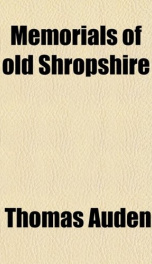memorials of old shropshire

Purchase of this book includes free trial access to www.million-books.com where you can read more than a million books for free. This is an OCR edition with typos. Excerpt from book: LUDLOW AND THE COUNCIL OF THE MARCHES By Caroline A. J. Skeel, D.Lnr., F.R.H1sr.S. Author of Tke Council in the Marches of Wales Thus farre I goe to prove this Wales in dede Or els at least, the martchers of the same. But further jpeake of shiere it is no neede, Save Ludloe now, a towne of noble fame: A goodly seate, where oft the councell lyes, Where monuments are found in auncient guyse: Where kings and queenes in pompe did long abyde, And where God plcasde that good Prince Arthur dyde. Churchyard.Worthines of Wales. of the smaller towns of England are so full of memories as Ludlow, "town of noble fame," and in few places can the connexion between the present and the past be more fully realized . The castle still crowns the hill that overlooks the meeting of the Teme and Corve; the tower of St . Lawrence's Church is a landmark as it was four centuries ago, but there is no clash of arms in the narrow streets, no eager throng watching from afar the coming of prince or president, little save memories to remind us of the days when Ludlow was the capital of the Marches and the seat of a vice-regal court . Yet such memories grow strangely vivid as we walk along the streets once trodden by Prince Edward and Princess Mary, or enter the castle which was the home of Lacys and Mortimers, Sydneys and Herberts, or look at the windows from which " the verse of Comus was first shaken into the air of England." The greatest days of Ludlow were from the fifteenth century down to the revolution of 1688, when it was the most usual meeting-place of the Council in the Marches of Wales. But long before the establishment of the Council Ludlow had been the chief seat of the Mortimer power: there Richard Duke of York had mustered the army which melted away in the rout of Ludford B...
Users who have this book
Users who want this book
What readers are saying
What do you think? Write your own comment on this book!
write a commentif you like memorials of old shropshire try:
Other books by this author
Do you want to exchange books? It’s EASY!
Get registered and find other users who want to give their favourite books to good hands!


